|
|
|
Sort Order |
|
|
|
Items / Page
|
|
|
|
|
|
|
| Srl | Item |
| 1 |
ID:
119271
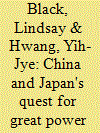

|
|
|
|
|
| Publication |
2012.
|
| Summary/Abstract |
In responding to piracy in the Gulf of Aden, both Chinese and Japanese policymakers have acted as norm entrepreneurs who intend to transform the dominant norms of international society. Chinese and Japanese norm entrepreneurship is grounded in the ways in which foreign policy actors construct and reconstruct their state identity. In China's case, policymakers have projected China's self-image as a responsible and benevolent Great Power that derives from the Chinese conception of Tianxia. Japanese foreign policy actors, on the other hand, have advanced the notion of Japan as a bridge that mediates between East and West, developing and developed states, members and non-members of international society. Although we do not advocate that Chinese or Japanese norm entrepreneurship should be accepted uncritically, we do maintain that there exist opportunities to combine and develop the multiple approaches that different states promote to problems. This article has shown that dealing with Somali piracy is one such case.
|
|
|
|
|
|
|
|
|
|
|
|
|
|
|
|
| 2 |
ID:
103195
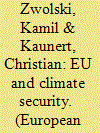

|
|
|
|
|
| Publication |
2011.
|
| Summary/Abstract |
This article analyses the development of the European Union (EU) as a global actor in the area of climate security. Building on this, it explicitly draws on constructivist concepts such as norm entrepreneurship and epistemic communities. To this end, it adopts the framework of epistemic communities, as developed by Peter Haas, in order to suggest that there is a group of EU officials, EU member states and think-tank activists, who drive the climate security agenda of the EU. Thus, it examines the precise actors involved in this EU epistemic community for climate security. This group promotes a reason for action at the global level, resulting in the attempt to diffuse this norm: climate change has consequences for international security; thus, it requires the development of appropriate policies and capabilities within the EU and globally. This article suggests that the epistemic community on climate security has been effective at diffusing this norm at both levels, albeit with differences.
|
|
|
|
|
|
|
|
|
|
|
|
|
|
|
|
| 3 |
ID:
138231
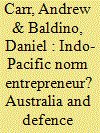

|
|
|
|
|
| Summary/Abstract |
The Indian Ocean is a region of increasing importance, with booming economic opportunities, shifting power dynamics and rising geopolitical competition. To manage this transition some Australian policy-makers are advocating the practice of defence diplomacy as a mechanism to help mould cooperative practices and to build regional trust while dissipating potential or ongoing regional flashpoints. Australia’s 2013 Defence White Paper identified Australia as an agent who can play a critical part in the emergence of certain types of norms as a means of conflict prevention and crisis management in the Indo-Pacific region. This paper explores the use of defence diplomacy as a means for seeking regional influence. It uses an innovative new framework of norm entrepreneurship to examine the choices facing Australian policymakers in increasingly complex security environment. This paper argues that while Australia should aim to promote defence diplomacy as a central part of rising security dialogue and practice with ‘like-mined’ countries, there must also be careful reflection to ensure that this objective is a constructive use of a middle power’s limited resources and influence.
|
|
|
|
|
|
|
|
|
|
|
|
|
|
|
|
| 4 |
ID:
153433
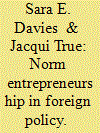

|
|
|
|
|
| Summary/Abstract |
Theories of international norm diffusion rely on accounts of entrepreneurial action almost exclusively identified as normative non-state actors who persuade powerful states to change their behaviour. We argue that powerful state agents can (also) be moral norm entrepreneurs and explicate the foreign policy acts that make them significant agents of international socialisation. Unlike non-state actors who set the agenda by advocating for new norms, foreign policy leaders leverage their identity and position to advance the recognition and diffusion of already established norms by reframing the moral prerogative of the ‘national interest’. The paper examines a prominent case, namely former British foreign secretary, Mr. William Hague's promotion, through the offices of the British Foreign Commonwealth, of the international norm prohibiting use of sexual violence in conflict. We ask why and how did the United Kingdom and William Hague devote the attention and resources of the foreign policy apparatus to further this norm established more than a decade earlier in the Rome Statute of the ICC and by gender justice advocates?
|
|
|
|
|
|
|
|
|
|
|
|
|
|
|
|
| 5 |
ID:
151391
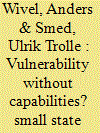

|
|
|
|
|
| Summary/Abstract |
Today, small European states regularly need to go out of area and out of tried and tested institutional settings to defend their security interests. How do small European states meet this challenge most effectively? This analysis suggests that small states can influence multilateral decisions on international security by combining norm entrepreneurship with lobbying and taking on the role as an “honest broker”. However, economic capacity, an effective state administration, and interests compatible with the agendas of the great powers are key to success. Based on a comprehensive empirical material including 19 elite interviews as well as official documents and other written material, we process trace how one small European state, Denmark, influenced the development of international counter-piracy cooperation and the development of an international counter-piracy strategy for the Gulf of Aden and off the Horn of Africa and discuss which lessons the Danish case may hold for other small states.
|
|
|
|
|
|
|
|
|
|
|
|
|
|
|
|
|
|
|
|
|